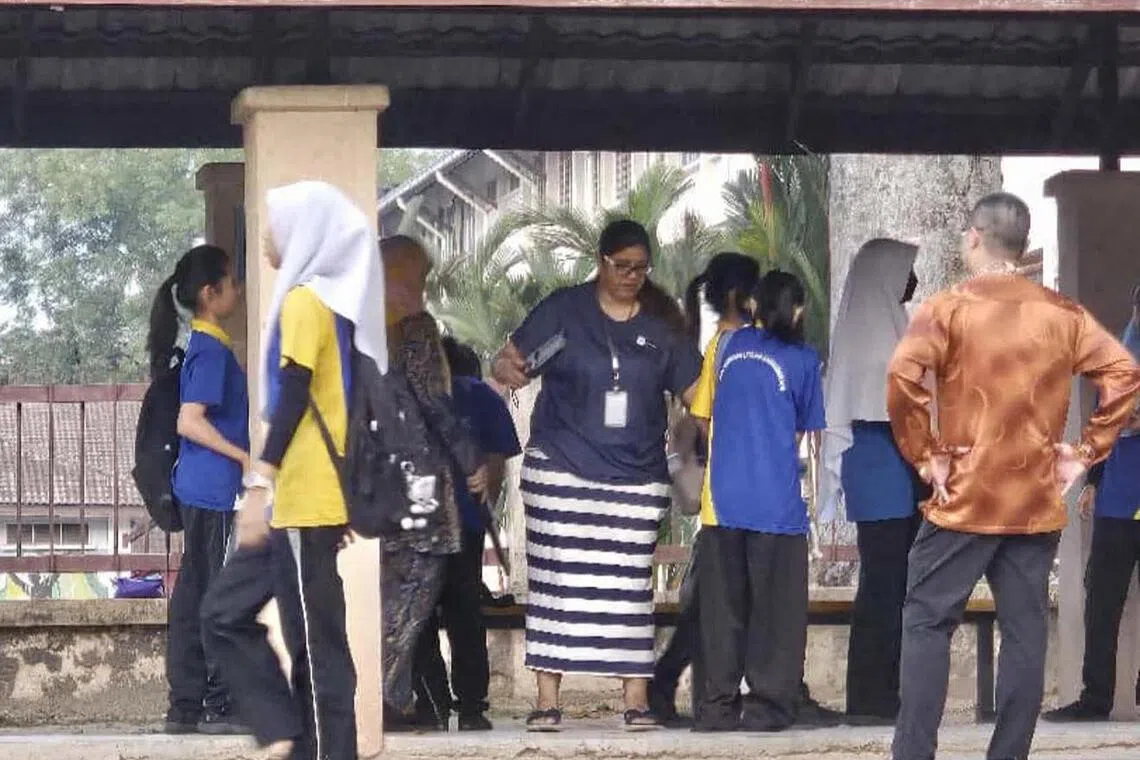Malaysia weighs caning, tighter phone ban amid alarm over rising student violence in schools
Sign up now: Get insights on the biggest stories in Malaysia

A teacher from SMK Bandar Utama Damansara 4 using a metal detector to screen students before they enter the school compound.
ST PHOTO: SHARIL AZRI
Follow topic:
- Malaysia considers stricter school rules due to rising violence, including reviving caning with safeguards in place and enhancing restrictions on smartphone and social media usage.
- Critics argue that punishment and bans oversimplify the issue and may not address root causes like neglect and systemic failures within the education system.
- The government plans to strengthen moral values with Character Education lessons in 2027 and hold social media more accountable for content hosted, alongside deploying counsellors and installing CCTVs in school.
AI generated
KUALA LUMPUR - Malaysia is considering reviving the use of caning and tightening the ban on smartphones in schools, while curbing the use of social media for those under 16, as part of broader efforts to curb rising indiscipline, bullying and violent behaviour among young people.
But observers say the real problem lies in neglect, mental strain and a school system struggling to keep up.
The proposals follow a wave of violence in schools over the past few months which has reignited public debate over student safety, moral education and the effectiveness of school discipline.
Among other incidents, a gang rape case in Melaka statutory rape case in Kedah
Prime Minister Anwar Ibrahim on Oct 17 said the government is open to allowing teachers to administer caning under strict guidelines to restore order in schools, though he stressed the need for a balanced approach grounded in “care and compassion”.
“Schools must not cover up bullying cases. Even in minor incidents, teachers should advise and, if necessary, administer caning as a form of reprimand,” he said in Putrajaya.
“While human rights groups may see this as excessive, in certain cases we need to allow some flexibility, with tight safeguards in place.”
Besides the two rape cases, Malaysia is also reeling from the Oct 14 brutal killing of a 16-year-old bullying incidents in Sabah
In response, the Cabinet on Oct 17 proposed raising the minimum age for social media users to 16, up from the previously proposed age of 13. Home Minister Saifuddin Nasution Ismail also said that police will step up patrols and digital safety awareness campaigns.
According to the Education Ministry, caning is allowed in schools under strict guidelines, but some teachers say the practice has been largely discouraged in recent years.
Additionally, a 2018 Education Ministry circular already prohibits students from taking smartphones to school, though tablets and laptops are permitted with school approval.
“There have been gaps in enforcement which need to be addressed,” said a ministry official, who declined to be named as he is not authorised to speak to the media.
He added that the ministry is now reviewing the guidelines to ensure they are more effectively implemented.
Datuk Seri Anwar and Selangor police have since Oct 15 laid the blame on unchecked social media use
Mr Anwar said Malaysia could draw lessons from countries that have already imposed similar restrictions.
Australia, France and Britain are among countries that have banned smartphone use in schools to curb distractions and promote in-person learning.
Civil society advocates disagree with Mr Anwar. According to them, there is little proof that banning smartphones in schools and reviving corporal punishment will curb violence in schools.
Child rights activist Hartini Zainudin wrote on Facebook on Oct 17 that research from countries such as Britain and Australia reveals “little evidence that bans curb deeper violence, bullying, or despair”.
“Phones may amplify cruelty, but they don’t create it. Violence in schools is rooted in something far more human: adult neglect, systemic failure and the silence that follows every tragedy,” she wrote in response to the government proposal.
Mr Aizat Shamsuddin, co-founder of Initiate.my, a youth group that works to prevent and counter violent extremism, told The Straits Times that measures such as caning may provide only short-term deterrence.
“Punishment may deter immediate misbehaviour, but it doesn’t address the underlying emotional distress that drives violence,” he said.
He highlighted that Malaysia’s school counselling system remains under-resourced, limiting its ability to provide early intervention and emotional support to students in distress.
“Teachers and counsellors must be trained to recognise early warning signs such as aggression, social withdrawal or manipulation so they can intervene before problems escalate.”
Mr Aziff Azuddin, a researcher at Kuala Lumpur-based think-tank Iman Research, said proponents of caning and smartphone bans are mostly attracted to these measures due to their simplicity.
“The science has shown that corporal punishment doesn’t solve the root of the problem,” he told ST
“Instilling fear through limited corporal punishment seeks to contain the outcome, but this does not deal with what causes anti-social behaviours,” he added.
Mr Aziff noted that children now have unrestricted access to online content, from educational to extremist material, while government policy has yet to catch up with these realities.
“The government should hold social media companies accountable for the content they host. Limiting access won’t work because children will always find ways to bypass restrictions,” he said.

Family members of a 16-year-old student who was stabbed in school holding a press conference after her funeral.
PHOTO: THE STAR/ASIA NEWS NETWORK
Education Minister Fadhlina Sidek had previously announced a RM3 million (S$917,000) plan to install CCTVs at 200 schools with a history of bullying incidents, in addition to plans to deploy counsellors to schools nationwide.
A new subject called Character Education will be introduced in the 2027 school curriculum, with pilot implementation starting in pre-school in 2026, to strengthen moral values and emotional development.
The government has also signalled plans
Meanwhile, some schools have already started scanning students with handheld metal detectors, aimed at easing fears among parents and students, while others opt for daily spot checks.
“There are more than 1,000 students at my school. The spot checks can be time-consuming and stressful but, for now, this is necessary to make students feel safe and reassure parents,” said a teacher in Selangor. They also declined to be named, as they were not authorised to speak to the media.
However, the same teacher welcomed the government’s proposal to restore caning.
“Caning is time-tested. It has proven effective in keeping problematic students in line. I am talking as a teacher and a father,” he said.
But even as the government tightens policies, some parents are still struggling to keep up with the pace of change.

A teacher from SMK Bandar Utama Damansara 4 using a metal detector to screen students before they enter the school compound as a pre-emptive measure following the murder of a student earlier this week, in Petaling Jaya, Selangor, on Oct 16.
ST PHOTO: SHARIL AZRI
Most of them tend to underestimate the subtle influence of online culture, said the chairwoman of school watchdog Parent Action Group for Education, Datin Noor Azimah Abdul Rahim.
“Parents may think their sons are just watching comedy or gaming videos, but these can include sexist jokes or influencers promoting anti-feminist ideas,” she said.
Datin Noor Azimah said most adults are not trained to spot warning signs, which makes early intervention at home more difficult.
Ms Ain Husniza Saiful Nizam, a student activist who launched the Make Schools a Safer Place campaign
She told ST that blaming social media for school violence was like “slapping a band-aid on a rotting wound that has existed forever”, arguing that such problems stem from a longstanding culture of silence and denial in schools.
“The issue isn’t that children are not caned enough. It’s the adults who failed to create safe and respectful learning spaces,” she said.
For now, Malaysia’s struggle to balance discipline and compassion in its schools continues – with few easy answers in sight.
Sign up for our weekly
Asian Insider Malaysia Edition
newsletter to make sense of the big stories in Malaysia

